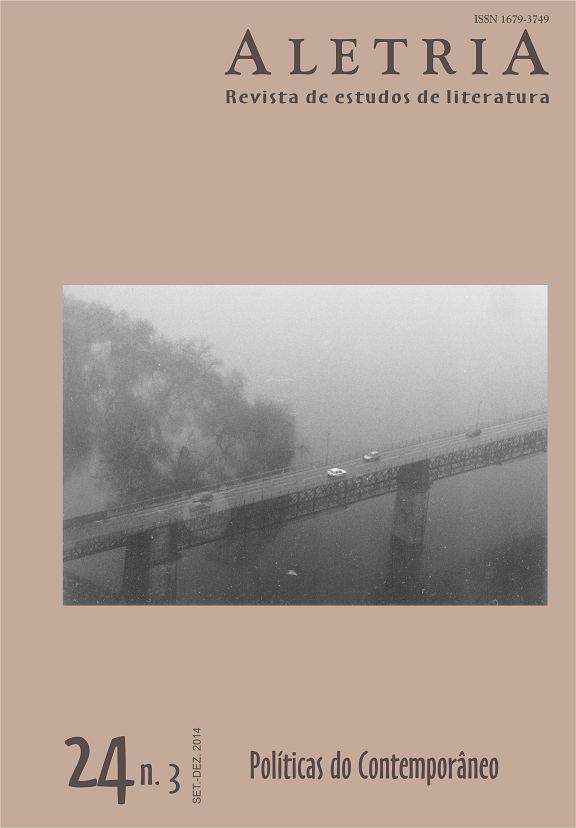Maurice Blanchot: política e escrita
DOI:
https://doi.org/10.17851/2317-2096.24.3.25-37Palabras clave:
Maurice Blanchot, política, crítica, literaturaResumen
Este artigo analisa o aprimoramento da escrita crítica de Maurice Blanchot a partir de seus textos políticos da década de 1930, textos que muitos pesquisadores avaliam como fascistas ou antissemitas. Ao longo de meu estudo, apresento certas contradições que impossibilitam classificar os escritos blanchotianos de 1930 sob a égide de qualquer doutrina. No processo crescente da escrita de Blanchot, o político, ou a política, nunca deixou de estar presente, seja para defender uma ideia de França utópica, seja para defender uma ideia de literatura, lembrando que no decorrer dos anos as posições políticas mudam e, sobretudo, o que se compreende por política. Como pressuposto teórico, dialogo, além de com os escritos de Blanchot, com os textos de Jean-Luc Nancy, Dionys Mascolo, Philippe Lacoue-Labarthe e Christophe Bident.
Descargas
Citas
BIDENT, Christophe. Maurice Blanchot: partenaire invisible: essai biographique. Paris: Champ Vallon, 1998.
BIDENT, Christophe. Maurice Blanchot: de la chronique à la théorisation. Revista Alea, Rio de Janeiro, v. 10, n. 1, p. 13-28, jan.-jun. 2008.
BIDENT, Christophe. Les mouvements du neutre. Revista Alea, Rio de Janeiro, v. 12, n. 1, p. 13-33, jan.-jun. 2010.
BIDENT, Christophe. Je t’aime… moi non plus – Maurice Blanchot à La NRF: secrétaire, critique, écrivain. Revista Letras de Hoje, Porto Alegre, v. 48, n. 2, p. 163-171, abr.-jun. 2013.
BLANCHOT, Maurice. La seule manière d’être Français. L’Insurgé, Paris, n. 23, p. 4, 16 jun. 1937a.
BLANCHOT, Maurice. L’Honneur de servir, par Henri Massis. L’Insurgé, Paris, n. 26, p. 5, 7 jul. 1937b.
BLANCHOT, Maurice. Thomas l’obscur. Paris: Gallimard, 1950.
BLANCHOT, Maurice. Le pas au-delà. Paris: Gallimard, 1973.
BLANCHOT, Maurice. L’écriture du désastre. Paris: Gallimard, 1980.
BLANCHOT, Maurice. O espaço literário. Tradução de Álvaro Cabral. Rio de Janeiro: Rocco, 1987.
BLANCHOT, Maurice. L’instant de ma mort. Paris: Gallimard, 2002.
BLANCHOT, Maurice. O livro por vir. Tradução de Leyla Perrone-Moisés. São Paulo: Martins Fontes, 2005.
BLANCHOT, Maurice. Les intellectuels en question. In: BLANCHOT, Maurice. La condition critique: articles 1945-1998. Paris: Gallimard, 2010.
BLANCHOT, Maurice. Lettre de Maurice Blanchot à Roger Laporte du 22 décembre 1984. In: NANCY, Jean-Luc. Maurice Blanchot: passion politique. Paris: Galilée, 2011.
COOLS, Arthur. Sur les écrits politiques de Maurice Blanchot 1931-1943. 1995. 109 f. Mémoire de Licence – Université d’Anvers, Bélgica, 1995.
DERRIDA, Jacques. Demeure: Maurice Blanchot. Paris: Galilée, 1998.
KAFKA, Franz. A metamorfose. Tradução de Modesto Carone. São Paulo: Companhia das Letras, 2010.
LACOUE-LABARTHE, Philippe. Agonie terminée, agonie interminable: sur Maurice Blanchot suivi de L’émoi. Paris: Galilée, 2011.
MASCOLO, Dionys. Lettre de Dionys Mascolo à Philippe Lacoue-Labarthe du 27 juillet 1984. In: NANCY, Jean-Luc. Maurice Blanchot: passion politique. Paris: Galilée, 2011.
MEHLMAN, Jeffrey. Legs de l’antisémitisme en France. Paris: Denoël, 1984.
PERRONE-MOISÉS, Leyla. Texto, crítica, escritura. São Paulo: Martins Fontes, 2005.
NANCY, Jean-Luc. Maurice Blanchot: passion politique. Paris: Galilée, 2011.
SÉITÉ, Yannick. Le siècle de Maurice Blanchot. In: BIDENT, Christophe; VILAR, Pierre. Maurice Blanchot: récits critiques. Paris: Farrago; Léo Scheer, 2003.
Descargas
Archivos adicionales
Publicado
Cómo citar
Número
Sección
Licencia
Derechos de autor 2014 Davi Andrade Pimentel (Autor)

Esta obra está bajo una licencia internacional Creative Commons Atribución 4.0.
Authors who publish with this journal agree to the following terms:Authors retain copyright and grant the journal right of first publication with the work simultaneously licensed under a Creative Commons Attribution Non-Commercial No Derivatives License that allows others to share the work with an acknowledgement of the work's authorship and initial publication in this journal.Authors are able to enter into separate, additional contractual arrangements for the non-exclusive distribution of the journal's published version of the work (e.g., post it to an institutional repository or publish it in a book), with an acknowledgement of its initial publication in this journal.Authors are permitted and encouraged to post their work online (e.g., in institutional repositories or on their website) prior to and during the submission process, as it can lead to productive exchanges, as well as earlier and greater citation of published work (See The Effect of Open Access).





